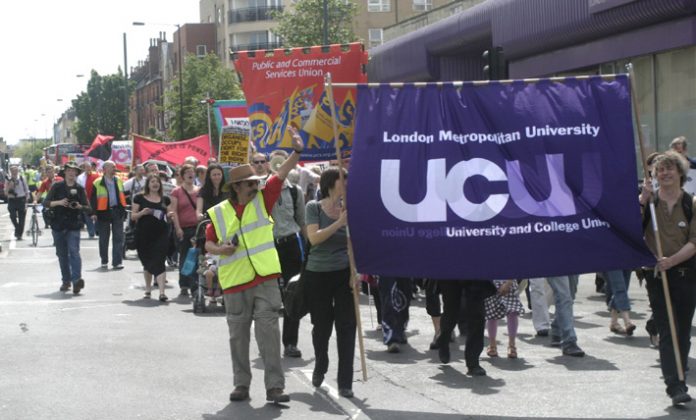
The University and College Union (UCU) said yesterday (Thursday) that forcing students to pick up the bill for higher education was an astonishingly weak, but somewhat predictable conclusion from the Policy Exchange.
The union said the think tank’s report, More Fees Please?, failed to consider any radical options for the funding of higher education and fell back on the lazy and tired option of students footing the bill.
The report calls for fees of £5,000 and a market in fees for different universities.
UCU general secretary, Sally Hunt, said: ‘Has the Policy Exchange really exhausted all the possibilities here or has it decided it wants higher fees for students and written a report to attempt to justify that position?
‘Deciding students should foot the bill is an astonishingly weak, but perhaps not surprising, conclusion.
‘Lord Mandelson recently suggested universities should look to diversify their funding, the Policy Exchange has done the opposite and wishes only to burden students and their families with even more debt.
‘Lord Dearing’s landmark report at the end of the last century said we needed to look at the balance between who pays for higher education – the state, the student and business.
‘This Policy Exchange report ignores the possibility of the state contributing more, as it is in countries like America, France and Germany as part of fiscal stimuli packages, and completely lets business off the hook.
‘We do not believe handing individual debts of tens of thousands of pounds to the next generation of students makes economic sense, nor do we believe that the most expensive university fees in the world will encourage the brightest people from the poorest backgrounds to apply to university.’
The National Union of Students (NUS) welcomed the report from Policy Exchange, noting that it criticised universities’ ‘resounding silence’ on the poor handling of the introduction of the current top up fee and student support system.
However, the NUS warned that Policy Exchange was advocating a market in higher education which would be disastrous for students and their families.
NUS President Wes Streeting said: ‘While there are fundamental flaws in this report, it is a timely and welcome contribution to the debate on the future of student funding, particularly at a time when so few in the higher education sector are willing to put their heads above the parapet and state their position in public.
‘It is quite right for Policy Exchange to call out vice chancellors’ “resounding silence”, and to criticise their failure to account fully for where students’ money has already been spent.
‘However, we cannot allow a rise in fees to expose students and their families to the risks, mistakes and potential calamities of the market.
‘Such a market would reinforce social and economic privilege, and price poorer students out of the most prestigious universities.
‘Also, it is disingenuous for Policy Exchange to call for higher fees without providing any information on how this money might actually be spent, especially as they have criticised vice chancellors for a lack of openness elsewhere in the same report.’
l Trade unions representing staff at the University of Westminster have accused the institution of plucking figures from the air to try and justify a round of ‘punishing and unnecessary’ job cuts.
The university has officially announced plans to give 285 staff notice by the end of April as they look to reduce staff costs to a figure of 60 per cent of total costs, described by the unions as arbitrary.
Representatives from the University and College Union (UCU) and Unison warned that unless the university comes clean on the thinking behind the redundancy plans then they could be left with little option but to call for strike action.
The funding council guidelines call for deficits to be recovered in three years, yet the university is looking to start axing staff in less than three months.
The unions have called on the university to explain the logic behind the 60 per cent figure and to ‘open the books’ to provide full details of the financial situation and provide the figures to justify such drastic proposals.
The University of Westminster is a teaching-intensive university so most of its costs will be related to staff costs, unlike at research-intensive universities that will have huge expenditure on equipment.
The unions are demanding to know why the redundancies have to be achieved over such a short time period and why they are being done on the basis of a projected, rather than an actual, deficit.
UCU and Unison both warned that the cuts will have a negative effect on the student experience and the quality of service students can expect at the university.
Barry Jones, UCU regional official for the University of Westminster, said: ‘The devastating cuts to higher education funding are no secret, despite government promises to protect education.
‘What is less clear is the logic behind the University of Westminster’s plans.
‘Where does the random 60 per cent staff costs figure come from?
‘Why must redundancies be made in such a hasty fashion?
‘Where is the long-term strategic plan?
‘What is the real financial situation at the university?
‘Until these questions are answered and the university opens its books nobody can have any confidence in the university’s plans or actions.
‘These cuts are both punishing and unnecessary.’
Janet Smith, Unison representative at University of Westminster, said: ‘Over the past year our members have been through one restructuring that is yet to finish.
‘This has already caused redundancies and left staff feeling stressed and demoralised.
‘We are now operating with a bare minimum of frontline staff and new layers of middle management.
‘The same people responsible for the chaotic restructuring are now overseeing the redundancy plan.
‘This does not give us any confidence that this process will be successful.’